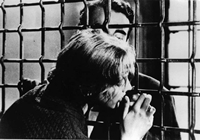Is It Really a Great Movie? Part Thirty-Three: Pickpocket
by dan heaton
Using Roger Ebert's Great Movies book as a guide, this series of articles will focus on all films included on his list that previously have escaped my notice. Since all lists are subjective, I am not treating Ebert's choices as the essential selection of films. However, his essays offer the perfect chance for me to explore both classics and lesser-known pictures from around the globe.

Acclaimed French director Robert Bresson is known for using non-professional actors and pushing them towards expressionless performances. Calling the actors “models,” he uses a painstaking approach to remove typical acting from the participants and deliver a raw experience. His filmography includes Diary of a Country Priest, A Man Escaped and Mouchette. One of his best-known works is 1959’s Pickpocket, which depicted the mindset of a small-time thief. This deliberate, yet intriguing picture was nominated for the Golden Bear at the Berlin International Film Festival and has been heralded by many experts as a classic. On the Criterion DVD release, Paul Schrader (writer of Taxi Driver) spends considerable time praising the film and discusses its unique aspects. It may not be widely known by audiences, but this engaging French movie deserves a closer look.
The story focuses on Michel (Martin La Salle) – an indistinguishable guy with a penchant for stealing other people’s jewelry, wallets and other personal items. After nearly being caught by the police, he wants to go the straight path, but discovers it’s almost impossible to change one’s true nature. Possible salvation comes from Jeanne (Marika Green), who cares for Michel’s mother and is dating his pal Jacques (Pierre Leymarie). But she appears to have a soft spot for him while suspecting his darker side. Michel is not the smartest guy and actually involves the local inspector (Jean Pélégri) in deep conversations about the actual damage of small crimes. If this wasn’t enough to put a target on his back, Michel also tends to look extremely creepy when standing in large crowds. His emotionless visage might appear to benefit a thief, but it also makes him stand out among the more engaged masses. While he fights an internal battle, Michel’s continued thievery might lead to an unfortunate result.
This was my first experience viewing a Bresson film, and I knew little about his focus on removing the performance from a role. Even without the close-ups and big scenes, this picture remains surprisingly interesting and moves quickly. Few major events occur throughout the middle portion, but it’s hard to take your eyes off Michel’s lifeless countenance. Bresson uses voice-over narration to depict the inner workings of the pickpocket’s mind, which keeps us involved in his plight. Michel isn’t really a bad guy, but he doesn’t really see the negative effects of his theft. Bresson clearly presents his actions but avoids judging him, which creates a realistic tone. While much of this story takes place in only a few rooms, it rarely feels like standard fare. The main conflict occurs within Michel’s mind, which carries us to the memorable conclusion.
Roger Ebert discusses the “incredible buried passion” in a Bresson film, and that excitement definitely exists within this film. Pickpocket could be dismissed by some as a boring exercise in art cinema, but its characters convey an energy just beneath the surface. Although Michel maintains an impassive demeanor, he is hardly dull and appears ready to explode without his thieving pursuits. He may be doomed to failure, but avoiding capture is not really his goal. Instead, Michel hopes to justify his stealing within his own heart, which might allow him to actually love Jeanne. Their relationship occurs without the standard romantic moments, which makes the possible connection even more appealing for us. I want to see more of Bresson’s work before deciding if this film is truly a Great Movie. It deserves a place in the discussion and provides a convincing look at a troubled soul.
Check out the entire series of "Is It Really a Great Movie?" articles here.
Copyright (c) 2007 erasing clouds |
|